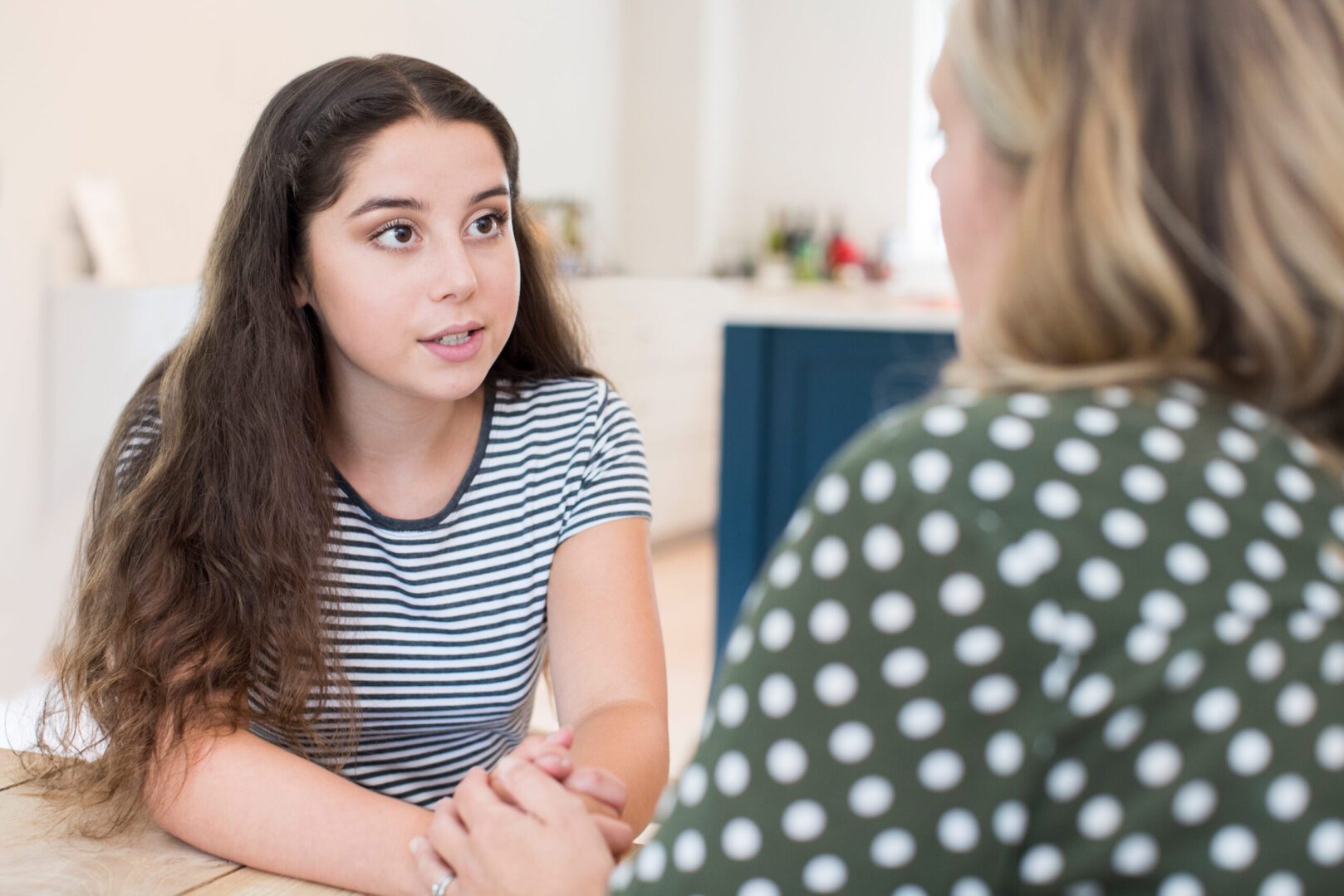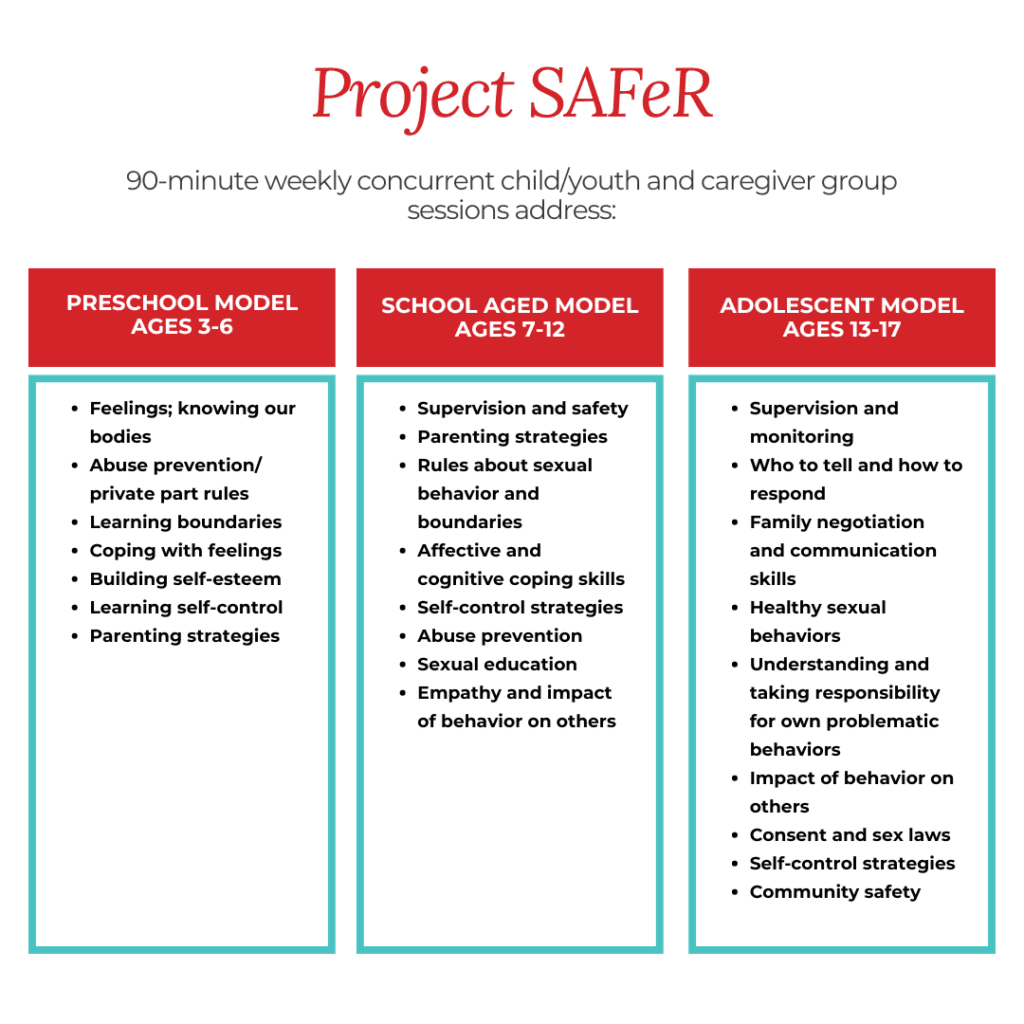
Supporting families through difficult behavioral challenges
Many kids struggle with impulse control, thinking through consequences, or knowing how to set boundaries and form healthy relationships. As caregivers, it can be tough to navigate conversations around healthy boundaries, relationships, or safe body rules, especially if those topics were not discussed openly when you were growing up.
Developmentally appropriate versus risky or problematic
Kids are naturally curious about the world around them. There is an appropriate level of risk-taking behavior and curiosity that is good for children and adolescents. But how do you know when behaviors are too risky, or the curiosity is no longer age appropriate? We talked with Shana Hazzard, LCSW-S, Director of Counseling and Substance Use Services about how caregivers can navigate these kinds of issues with young kids or teenagers. Here is a visual to show the difference between behaviors in adolescents that are developmentally appropriate, risky, and problematic.
Lena Pope can support families whose children are displaying risky or problematic behaviors. “In our Healthy Boundaries groups, we work with youth ages 10-17 who are displaying some risky behaviors and their families. We talk about topics like decision making, taking responsibility for your actions, healthy verses unhealthy relationships, staying safe (online and in-person), healthy communication, and education about reproductive anatomy, puberty, and sexual health,” shared Shana.
“Lena Pope is the only provider in Tarrant County who can work with youth displaying problematic sexual behaviors through our evidence-based Project SAFeR program,” Shana shared. This program provides group therapy for different ages, pre-school (3-6), school aged (7-12), and adolescent (13-17) and involves both the child and their caregiver. All kids are curious and push boundaries, but when you have a behavior that is developmentally inappropriate and the child won’t stop or change that behavior with normal parenting strategies, it is time for some additional support. We collaborate with Alliance for Children, Tarrant County Juvenile Services, and the Tarrant County District Attorney’s Office to assist families dealing with childhood problematic sexual behaviors. “We all want families in our community to thrive and ensure everyone has access to the help and support they need,” said Shana.
What do these programs cost?
Thanks to a generous grant from the Office of Juvenile Justice Delinquency and Prevention, all Project SAFeR groups are currently offered at no cost to families. This program has such a strong caregiver component because it is centered around setting appropriate boundaries, supervision, how to talk with children, etc. Many families commented after the program that Project SAFeR made them a better caregiver.
“I think there are some misconceptions around who needs our support through these kinds of programs. We see families of every race, every income level, and in all different parts of our city,” said Shana. We see kids displaying problematic sexual behaviors who also have impulse control issues, witnessed domestic violence, saw inappropriate online content, or don’t have skills yet to think through consequences of their behaviors.

Families who completed Project SAFeR shared how the program impacted them:
- It helped me realize that we are not alone. (caregiver)
- Helped me as a parent to be aware of signs and learned how to approach uncomfortable situations in a manner that my child will feel safe. (caregiver)
- Gave us a feeling of safety during these DARK days. (caregiver)
- It has helped me learn how to talk to my parents about difficult things (youth)
- Helped me feel better about my relationships with my parents. (youth)
Our Family-Centered Approach
At Lena Pope, our counseling team provides support to families through individual and family counseling or through our groups like Healthy Boundaries and Project SAFeR. In our programs, we believe it’s vital to have a family-centered approach that includes both caregivers and children, which results in stronger families and closer relationships.
“I’m really proud of our program. I think we’re doing amazing work. We have a phenomenal success rate and a low recidivism rate. We can offer the program in both English and Spanish. Families regularly talk about how impactful the SAFeR group has been for them as parents and for their child,” Shana said.
There is a clear need for these kinds of programs in our community, and your support of Lena Pope allows us to equip children and families with a strong foundation through important programs like Project SAFeR. Without Lena Pope offering this unique program, these families would not have anywhere else to turn. Thank you for sharing our belief that every child has potential and promise.
Resources and other information visit https://www.ncsby.org/